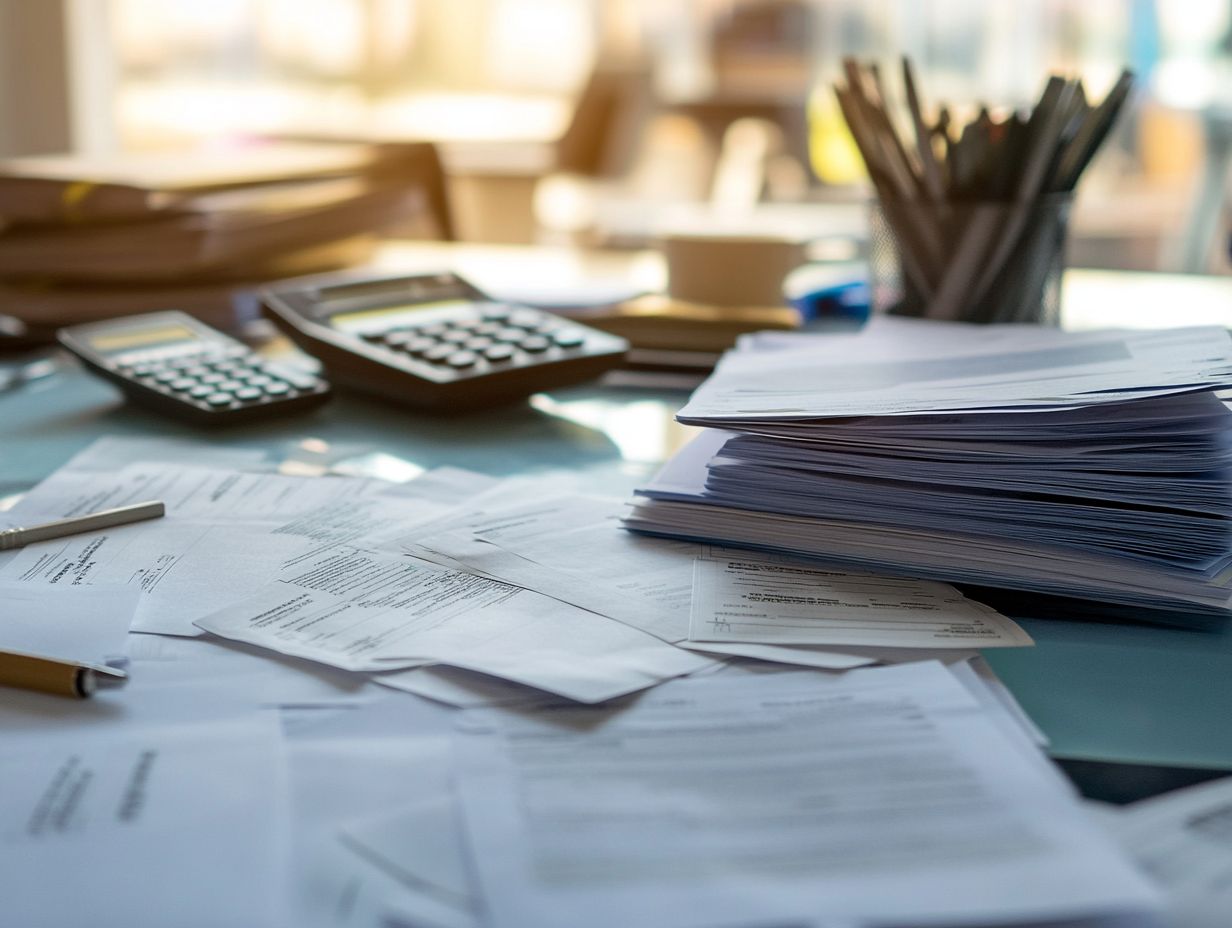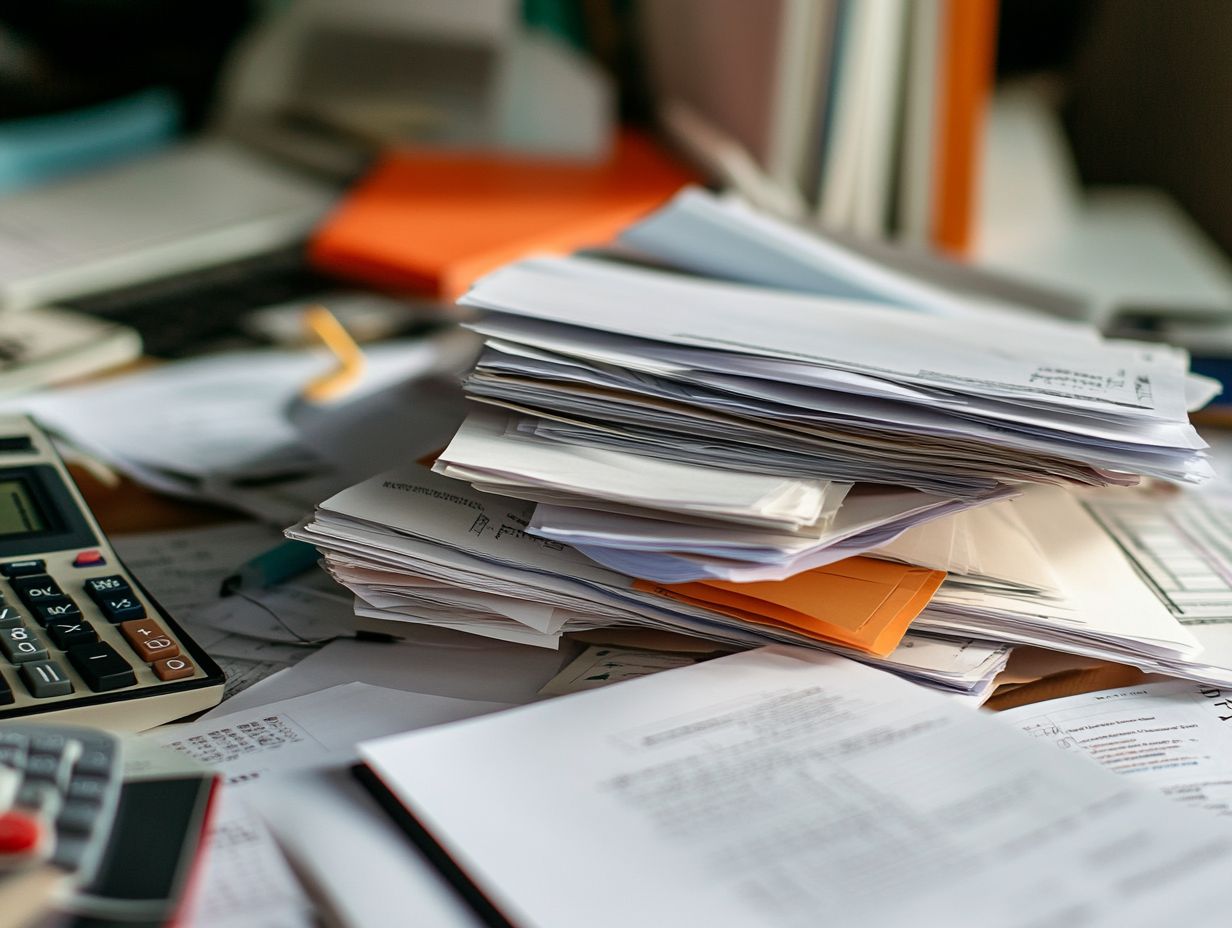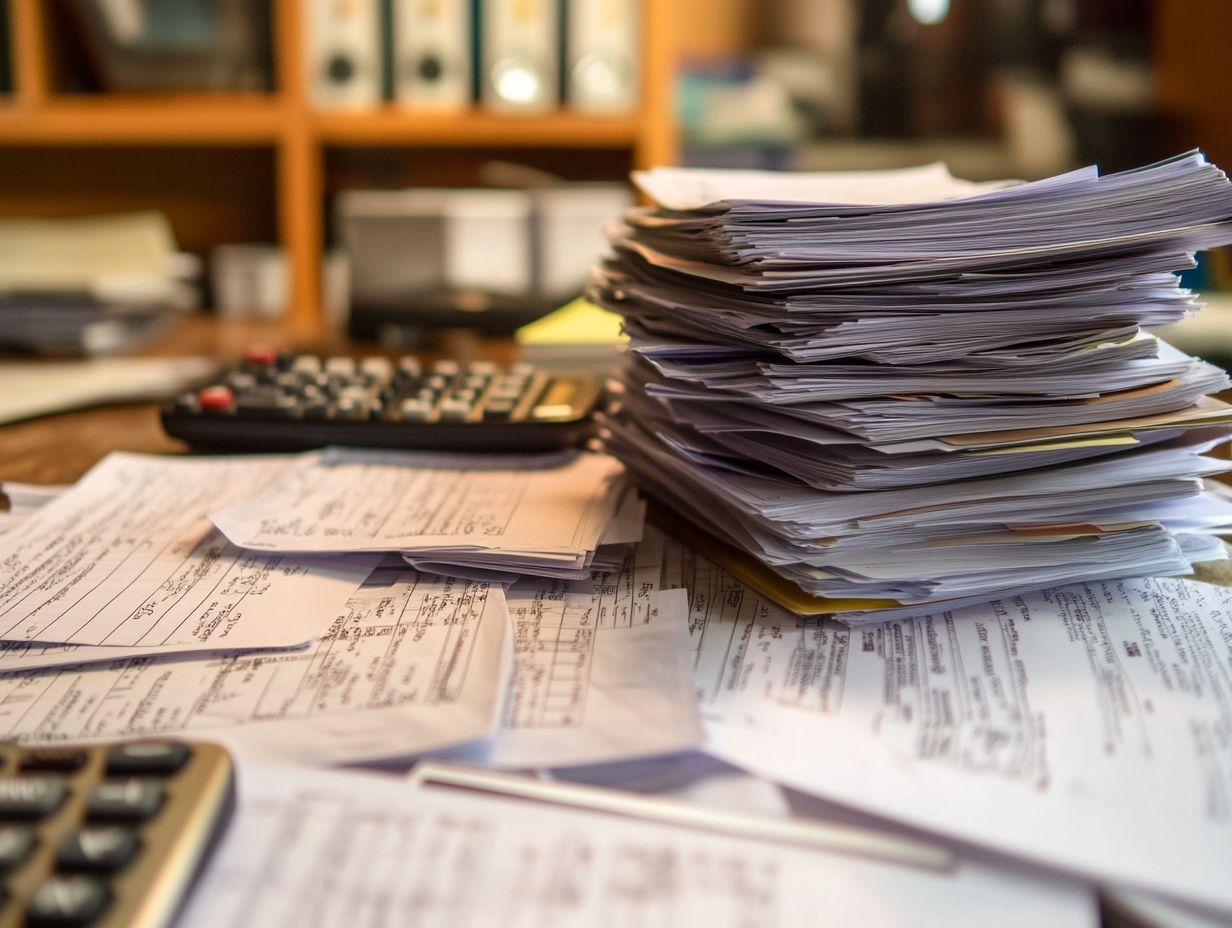The Importance of Accurate Record-Keeping for Taxes
Navigating the world of taxes can feel overwhelming, but with accurate record-keeping, you can streamline the entire process.
This article will guide you through the essentials of record-keeping, detailing what it involves and why it’s vital for your tax affairs. You’ll learn about the types of records you should maintain such as income and expense documentation and receive practical tips on how to organize and update them effectively.
You will uncover the benefits of diligent record-keeping, from steering clear of audits to maximizing your deductions. Stay informed and empowered as tax season draws near!
Contents
Key Takeaways:

- Accurate record-keeping is essential for taxes to ensure compliance with tax laws and regulations.
- Types of records to keep include income, expense, and documentation to support deductions and credits.
- Organizing and regularly updating records can help avoid penalties, maximize deductions, and aid in financial planning and budgeting.
The Basics of Record-Keeping for Taxes
It’s essential for business owners to grasp the fundamentals of record-keeping for taxes. Accurate documentation acts as a safeguard against IRS audits and ensures your compliance with federal tax regulations.
By maintaining proper records, you not only organize your financial statements and business expenses but also create a clear proof of expenses during tax return preparation. This diligence helps you maximize deductible expenses and simplifies your financial interactions with partners.
What is Record-Keeping?
Record-keeping is the systematic art of organizing and maintaining your financial documentation, including IRS records and supporting documents. This practice is crucial for tax compliance and the smooth operation of your business.
Effective record-keeping enables you to prepare accurate tax returns while providing a safety net during audits. By embracing a comprehensive approach, you can ensure that all essential information is carefully kept everything from income statements and receipts to bank statements and tax returns. It s wise to keep those supporting documents organized by year and category, making access effortless when the need arises.
Neglecting to maintain these records properly could lead to penalties or missed deductions, highlighting the necessity of a structured system. This ensures compliance and offers you a clear view of your financial landscape.
Why is it Important for Taxes?
Accurate record-keeping is paramount for your tax obligations. It provides solid proof of expenses that can shield your business during IRS audits and ensures your deductible expenses are thoroughly documented.
When you maintain organized financial records, you create a safety net that minimizes the risk of erroneous tax filings while bolstering your defense against potential IRS inquiries. Well-documented expenses can become invaluable assets during an audit, clearly delineating allowable deductions that can substantially reduce your tax liability.
In contrast, poor record-keeping might lead to missed deductions and increased scrutiny, which could ultimately result in penalties or heightened assessments. Therefore, prioritizing meticulous financial documentation fosters compliance and instills confidence as you navigate the complexities of the tax landscape.
Types of Records to Keep
For effective financial management and tax compliance, you need to maintain various types of records. This includes detailed financial statements, precise documentation of business expenses, and comprehensive tax records that cover income statements, canceled checks, and employment tax documents.
Ensuring that these records are meticulously organized will serve you well in navigating the complexities of finance and taxation.
Don t wait until tax season! Start organizing your records today to save time and stress later.
Income Records

Income records, especially detailed income statements, are essential for keeping your tax records straight and following IRS regulations.
These documents capture various income sources, including wages, freelance earnings, rental income, and investment returns. They provide a complete view of your financial situation. By categorizing and maintaining these records properly, you not only simplify tax calculations but also lower the chances of an IRS audit.
Keeping thorough documentation whether through physical files or digital spreadsheets makes it easy to find what you need during tax season or if any questions come up.
Establishing a consistent record-keeping routine can streamline the process, improve your financial planning, and reduce surprises when April rolls around.
Expense Records
Expense records are crucial for documenting all business expenses. They help you pinpoint expenses you can subtract from your taxable income and maintain accurate tax records.
These records typically include receipts, invoices, and bank statements. Each serves a unique purpose in illustrating your overall financial picture. By maintaining comprehensive documentation, you can effectively monitor both ordinary and necessary expenses related to your business activities.
For instance, organized expense logs help you differentiate between recurring costs, like utilities and supplies, and one-time investments, such as equipment purchases. This attention to detail not only maximizes your deductions but also ensures you follow tax regulations, giving you peace of mind during audits.
Receipts and Documentation
It’s vital to keep documents like receipts and canceled checks. They validate your business transactions and ensure your tax records are accurate.
These records serve as proof of expenses and are key during audits or tax assessments. Thorough documentation can truly make a difference. Well-organized receipts support your claimed deductions, ensuring compliance with tax regulations and lessening the risk of penalties.
This practice creates a clear financial picture, helping you make smart decisions quickly and budget for future projects!
A well-maintained filing system supports better decision-making, paving the way for strategic growth.
How to Keep Accurate Records
To keep accurate records, you must use effective strategies for organization and storage. This ensures your documents are easily accessible and regularly updated to reflect your financial transactions.
Organization and Storage
Effective organization and storage of records are essential to maintain systematic records and ensure easy access for future reference.
To enhance efficiency, adopt a systematic approach that categorizes documents by type, date, or department. Using a digital record-keeping system enables smooth access and retrieval, significantly lowering the risk of data loss.
Regular audits of your stored records help identify outdated or irrelevant files. This streamlines your workflow and maintains organization.
By training employees on best practices in record management, you foster a culture of accountability and diligence. Everyone will appreciate the importance of keeping comprehensive and accurate records for seamless future use.
Start organizing your records today! Consider creating a checklist for effective record-keeping.
Tracking and Updating Records

Regular tracking and updating of your records are essential for maintaining accuracy. This ensures a smooth process for tax filings.
By using a range of techniques like digital expense tracking apps or well-structured spreadsheets you can see a complete view of your financial activities. This careful approach helps you spot potential deductions and guarantees compliance with IRS regulations, which are the rules set by the Internal Revenue Service.
Regularly categorizing your expenses and reviewing bank statements enhances the precision of your records. When you consistently implement these practices, you simplify the tax preparation process and enjoy peace of mind. This enables you to navigate your financial responsibilities with confidence.
Benefits of Accurate Record-Keeping
Maintaining precise record-keeping practices unlocks numerous advantages. It helps you avoid penalties during IRS audits and maximizes your potential tax deductions.
It also improves your overall financial planning, enabling your business to thrive.
Avoiding Penalties and Audits
Keep your finances on point! Accurate record-keeping helps you dodge penalties and reduces your risk of IRS audits. It establishes a strong burden of proof for all your business transactions.
These well-maintained records defend against discrepancies and act as a roadmap for your financial health. By documenting your income, expenses, and deductions with precision, you create valuable transparency during an audit. This preparedness shields you from potential fines and instills confidence in your tax reporting.
With organized financial data at your fingertips, you can respond swiftly to any inquiries from the IRS, minimizing stress and avoiding delays.
The discipline of conscientious record-keeping fosters a culture of accountability within your business. This ensures you are always ready for any scrutiny or examination that may arise.
Maximizing Tax Deductions and Credits
By maintaining thorough and accurate tax records, you can maximize your tax deductions and credits. Ensuring that all eligible deductible expenses are accounted for is crucial.
This careful approach streamlines the filing process and provides a robust defense against potential audits by tax authorities. Understanding deductible expenses like operational costs, employee benefits, and certain travel expenditures enables you to leverage available tax credits fully.
Using digital tools and software for record-keeping improves accuracy and simplifies the retrieval of essential documents. Regularly reviewing your financial statements keeps you in control of your deductibles, allowing for timely adjustments that enhance your overall tax strategy and financial health.
Financial Planning and Budgeting
Accurate record-keeping is essential for effective financial planning and budgeting. It enables you to analyze your expenses and manage your resources strategically.
Keeping detailed and precise records reveals insights into your spending behaviors and patterns. This understanding helps you identify areas to cut costs and allocate funds efficiently towards growth opportunities.
By regularly reviewing your financial data, you can anticipate future expenses, assess your resource needs, and align your budgeting practices with your strategic goals. This meticulous documentation enhances your decision-making and fosters long-term financial stability, ensuring optimal use of financial resources while minimizing waste.
Frequently Asked Questions

What is the importance of accurate record-keeping for taxes?
Accurate record-keeping for taxes is crucial for complying with tax laws and regulations. It helps you properly report income and expenses to the government.
What happens if I don t keep accurate tax records?
Without accurate tax records, you may face penalties, fines, or even legal issues. The government could suspect you of tax evasion or fraud.
How does keeping accurate records help me?
Keeping accurate tax records saves you time and reduces stress during tax season. It can also help you maximize deductions and credits, lowering the amount you owe.
What documents should I keep for my taxes?
Keep all documents related to your income and expenses. This includes receipts, bank statements, invoices, and tax forms, as well as any papers that support deductions or credits.
What record-keeping method is best?
There’s no single best method for everyone. Find a system that suits your needs and helps you track and organize your tax records throughout the year.
What are some tips for accurate tax records?
To maintain accurate tax records, keep your documents organized and accessible. Regularly review and update them, and don t hesitate to seek professional help if needed.













